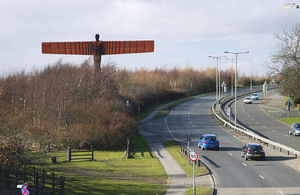Northern transport investment to help create thousands of jobs
Figures show greater spending on road and rail upgrades in the north compared to London and the south.

Transport spending in the north over the next 3 years will be higher than in London and the south, new figures today reveal (25 June 2018).
The Department for Transport’s analysis of future spending shows, between 2018 and 2021, it will be investing £831 per head on road and rail upgrades in the north-east, north-west and Yorkshire and the Humber – more than £30 more per head than London and the south at £799.
The figures emerged as Aviation Minister Baroness Sugg visited Liverpool Airport ahead of attending the Northern Transport Summit in Manchester, where she will say Heathrow expansion could lead to tens of thousands of jobs as businesses take advantage of the UK’s improved connections with the rest of the world.
Aviation Minister Baroness Sugg said:
We are investing more than £13 billion to improve connections across the north between 2015 and 2020, getting people to their work, family and friends, quicker and easier than before.
This investment demonstrates the government’s commitment to the Northern Powerhouse, which will help unlock economic growth and much-needed housing across the region.
And a new Heathrow runway will bring further benefits to the north, better connecting the region’s airports with the UK’s hub airport and opening up new trade opportunities which could deliver a further boost to the northern economy.
The government last week confirmed that it is prepared to intervene to reserve slots at Heathrow for flights to airports in nations and regions around the UK if expansion goes ahead. It would ensure flights to domestic airports are safeguarded, ensuring important links will remain in place. This is in addition to Chris Grayling’s confirmation that 15% of the new capacity at Heathrow would be reserved for domestic flights.
On rail, more than £1 billion is being spent on improving the north’s rail network with further investment through the Northern and TransPennine Express franchises to deliver room for 40,000 more passengers to travel on over 2,000 more services a week, with all trains replaced or refurbished by 2020. The government also plans to invest a further £3 billion upgrading the Transpennine rail route, better connecting Manchester, Leeds and York. Rail passengers will also benefit from smart ticketing, reducing the stress of buying tickets at a station.
In addition, as part of the government’s commitment to Northern Powerhouse Rail (NPR), Transport for the North has been given £60 million to develop proposals for the scheme, alongside investing £300 million to ensure HS2 can accommodate future NPR services.
On roads, last month, the last stretch of motorway-standard road between Newcastle and London via the A1(M) and M1 was officially opened, providing quicker connections from the north-east, creating new opportunities for businesses. The final section of the M62 upgrade between Leeds and Manchester is expected to start construction in 2019/20, leading to quicker, safer and more reliable journeys.
Highways England will also start constructing a further 22 projects in the north over the next 3 years, including 3 upgrades on the M6 near Manchester, the A585 Windy Harbour to Skippool, dualling the A1 between Morpeth and Ellingham and improving junctions on the M621.
Other improvements
Other improvements to benefit the north include:
- innovative trials in York and Newcastle will see how wireless technology can help reduce congestion in cities with vehicles communicating with traffic lights
- in the long term, HS2 will enable quicker journeys around the north, as well as open up space on the existing rail line for commuter services
- Sheffield’s ground-breaking new tram-train project – Supertram – is now in service on the existing tram network and from later this year it will use the rail network to give passengers quick and easy travel between Sheffield and Rotherham, cutting congestion and improving connectivity
- we are supporting the Tyne and Wear Metro, which connects Newcastle, Gateshead and Sunderland with Newcastle Airport, with £317 million for its reinvigoration and renewal programme, £229 million towards its running costs and, in the Budget, the Chancellor announced a £337 million direct grant to deliver a new fleet of trains for the Tyne and Wear Metro
- the A6 Manchester Airport Relief Road will also mean it will be easier for passengers to get to and from flights. This is one of 6 major local road schemes due to complete in the next three years. Stockport Town Centre Major Scheme, East Riding Road Maintenance and North Yorkshire Road Maintenance Scheme are under construction. Congleton Link Road and Sunderland Strategic Transport Corridor could also be completed if business cases are approved. A further 5 schemes are also expected to start by 2021 – Preston Western Distributor Road, Poynton Relief Road, A630 Parkway, Middlewich Eastern Bypass and Jock’s Lodge Junction
| Spend per head by region | 2018/19 to 2020/21 - total 3 years |
|---|---|
| The middle (east of England plus East Midlands plus West Midlands) | 864 |
| The north(north-east plus north-west plus Yorkshire and Humber) | 831 |
| The south (London plus south-east plus south-west) | 799 |
Roads media enquiries
Media enquiries 0300 7777 878
Switchboard 0300 330 3000